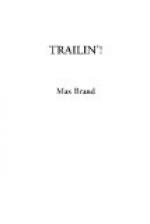“‘If you don’t mind,’ he says, ’I think I’ll switch my order and take that whisky instead. I seem to need it.’
“‘Son!’ says I, ‘there ain’t nothin’ in the house you can’t have for the askin’. Try some of this!’
“And I pulled out a bottle of my private stock—you know the stuff; I’ve had it twenty-five years, and it was ten years old when I got it. That ain’t as much of a lie as it sounds.
“He takes a glass of it and sips it, sort of suspicious, like a wolf scentin’ the wind for an elk in winter. Then his face lighted up like a lantern had been flashed on it. You’d of thought that he was lookin’ his long-lost brother in the eye from the way he smiled at me. He holds the glass up and lets the light come through it, showin’ the little traces and bubbles of oil.
“‘May I know your name?’ he says.
“It made me feel like Rockerbilt, hearin’ him say that, in that special voice.
“‘Me,’ says I, ‘I’m Flanders.’
“‘It’s an honour to know you, Mr. Flanders,’ he says. ’My name is Anthony Bard.’
“We shook hands, and his grip was three fourths man, I’ll tell the world.
“‘Good liquor,’ says he, ’is like a fine lady. Only a gentleman can appreciate it. I drink to you, sir.’
“So that’s how Sandy Ferguson went under the sod. To-day? Well, I couldn’t let Ferguson stand in a barroom where a gentleman had been, could I?”
CHAPTER XV
THE DARKNESS IN ELDARA
Even the stout roan grew weary during the third day, and when they topped the last rise of hills, and looked down to darker shadows in Eldara in the black heart of the hollow, the mustang stood with hanging head, and one ear flopped forward. Cruel indeed had been the pace which Nash maintained, yet they had never been able to overhaul the flying piebald of Anthony Bard.
As they trotted down the slope, Nash looked to his equipment, handled his revolver, felt the strands of the lariat, and resting only his toes in the stirrups, eased all his muscles to make sure that they were uncramped from the long journey. He was fit; there was no doubt of that.
Coming down the main street—for Eldara boasted no fewer than three thoroughfares—the first houses which Nash passed showed no lights. As far as he could see, the blinds were all drawn; not even the glimmer of a candle showed, and the voices which he heard were muffled and low.
He thought of plague or some other disaster which might have overtaken the little village and wiped out nine tenths of the populace in a day. Only such a thing could account for silence in Eldara. There should have been bursts and roars of laughter here and there, and now and then a harsh stream of cursing. There should have been clatter of kitchen tins; there should have been neighing of horses; there should have been the quiver and tingle of children’s voices at play in the dusty streets. But there was none of this. The silence was as thick and oppressive as the unbroken dark of the night. Even Butler’s saloon was closed!




